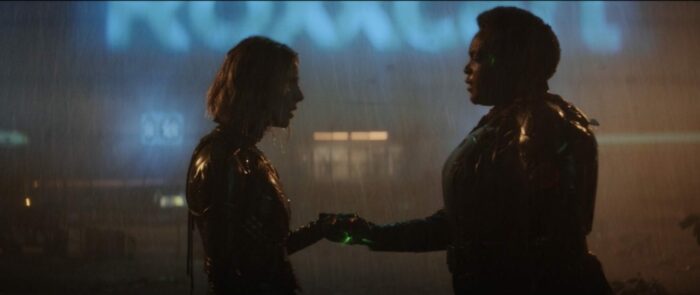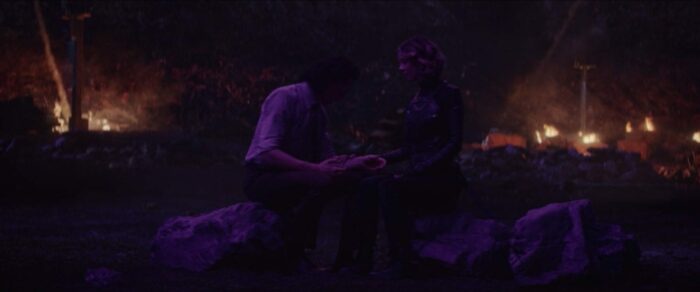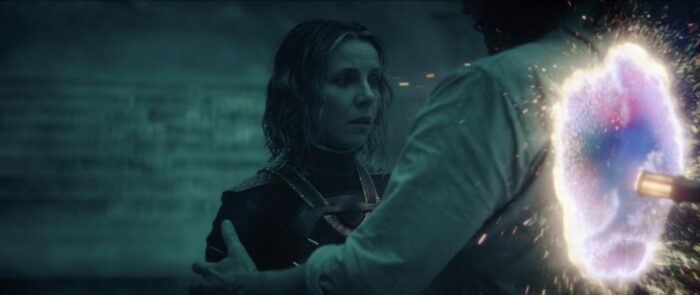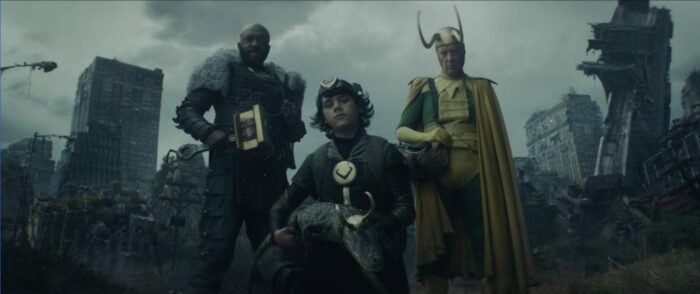Loki S1E4 “The Nexus Event” hit us with a million different whacks to the head from every direction. (There’s a reason this article is coming out two days post-airing.)
The completion of Loki’s first character arc, Marvel’s meta-examination of villainy, commentary on religious extremism or bureaucracy, Sylvie’s backstory, how the Timekeepers connect to the greater MCU, Ravonna Renslayer’s turn to nuanced antagonist, Hunter B-15’s turn to hesitant ally, Mobius’s death (ish), Loki’s 4th on-screen death (ish), the mother-f*cking-end-credits-scene.
A whole ton of articles have already come out from various more comic-informed sources than my own, so instead, in order to cover what I see as the crux of the series at this point, this week’s Loki breakdown is going to focus entirely on character.
Let’s begin!
Mobius M. Mobius
You can be whoever, whatever you wanna be—even someone good. I mean, just in case anyone ever told you different.
Oh, Mobius, my beloved.
Agent Mobius (Owen Wilson) “died” (still a little iffy on that count) after betraying Ravonna and the TVA by helping Loki escape. His decision was made upon learning from Loki that all the TVA agents are, indeed, variants.
Mobius and Ravonna’s relationship was fleshed out in greater detail this week, as their friendship took a backseat to her status within the TVA.
Ravonna refuses to let Mobius interrogate Sylvie upon her capture, citing his failure to keep Loki in check the day the Asgardian was first brought in. Her motivations appear to be far more sinister, however, as Mobius discovers when he steals her tempad and finds video evidence of her covering up the TVA’s secret about its agents.
After Hunter C-20 was “rescued” from Sylvie’s clutches at the end of S1E2, “The Variant,” Ravonna tells a curious Mobius in S1E4, “The Nexus Event,” that C-20 eventually went insane because of Sylvie’s mind tricks. This, combined with Ravonna’s reluctance to let him interview Sylvie, tips off Mobius to start poking into Ravonna’s business. The tempad reveals that C-20 discovered she was a variant because of Sylvie’s interference in her mind, and that Ravonna covered up this discovery. It’s this betrayal that causes Mobius to change loyalties and return to Loki.

Speaking of…
We got a lovely bit of jealous-ex-boyfriend action from Mobius in “The Nexus Event” (I say jokingly… mostly… somewhat… a bit…), as he returns to his role as the TVA’s resident Loki-interrogator. This time, however, he’s in a much more heightened emotional state. The coldness that made his chemistry with Loki somewhat awkward in S1E1 “Glorious Purpose” is gone, replaced by genuine betrayal. We get the real sense that Mobius trusted Loki. He was the first person to break through Loki’s shell and begin to reveal the man underneath.
The twinge of jealousy and anger comes as Mobius uses Loki’s connection to Sylvie in an attempt to get information out of Loki. Mobius tells Loki that Sylvie is dead—sees that face—and winds him up. Loki attempts to lie his way out of the obvious heartbreak written all over his features, but Mobius knows him too well at this point.
This emotional setpiece works extremely well when held up next to the pair’s discussion in S1E2 “The Variant,” as they discussed the role of the TVA and its seemingly total omniscience. Mobius seeks order and stability (or, at least, he believes that he does), but his memories of Jet Skis, once played off as a joke, poke holes in that stability.
Loki is offering him chaos—an out from the TVA’s rigidity—but without the promise of secure friendship and trust. It’s a journey the two of them had to take together, as Loki learned to trust and was able to offer Mobius the genuine connection he was lacking in the TVA, as Mobius discovers when Ravonna is so quick to betray him in favor of the Timekeepers.
There’s also a lovely “betrayer-betrayee” theme at play here, as Loki and Mobius bicker about how Loki’s escape tore them apart, and especially in the potential for Ravonna’s character to see Mobius’s betrayal of the TVA as a direct betrayal of her. While the audience is more likely sympathetic to Mobius in this situation, it makes such a rich, nuanced antagonist out of Ravonna if she held true feelings of friendship towards Mobius.
Ravonna Renslayer
Friends against time, allies to the end… friendship like ours is uncommon.
Gugu Mbatha-Raw is a powerhouse. Her performance as Ravonna Renslayer really kicks it up a notch this week, as we finally get the character’s backstory into play and she becomes a vital leading character in the series.

Loki S1E4 “The Nexus Event” kicks off with a cold open flashback that takes us to Sylvie’s childhood and the moment the TVA stepped in on Asgard to remove her from the timeline. Ravonna appears as the lead Hunter in charge of Sylvie’s capture, and as we see young Sylvie escape her grasp, we are given an insight as to why the whole Loki case is so personal to the judge.
Ravonna’s colors are cold and foreboding in this episode as she’s framed in misty blue at the top of the episode in a meeting with the Timekeepers. The glittering golden glow of her office is slightly dulled, less bright as she and Mobius discuss the close of the Loki case in her office. Mbatha-Raw absolutely nails Ravonna’s ability to lie as a contrast to Loki’s—meticulous, unadorned, slightly uncomfortable where Loki’s style is big, theatrical, improvisational. As Mobius rocks back and forth between his new friendship with Loki and his old friendship with Ravonna, we, the audience, can see a bit of the comparison. He can’t seem to escape liars.
(There’s a beautiful flip in the narrative as the episode begins with Mobius’s friendship with Loki on the rocks, believing himself to have been betrayed by the Mischief God, and the episode ends with Mobius being betrayed by his dearest friend to the point of, y’know, murder.)
Ravonna also establishes herself, for next week anyway, as Loki’s main narrative antagonist. As with the shift from Hiddleston’s Loki to Sophia di Martino’s, we move in perspective from one lead TVA agent (fun, friendly Mobius) to another (did I mention the murder?).
Needless to say, Ravonna’s arc has the potential to be something extremely exciting and rare for the MCU. This whole show is about the nature of villainy. If Loki can choose not to be a villain, perhaps orderly, bureaucratic Ravonna Renslayer chose to be one?
It’s also truly refreshing to see a Black woman in the MCU in a leading role that is nuanced, both in the morality of her character and the depth of her backstory. There will be more to come in the analysis of Marvel’s representation of Black women throughout the years (just watched YouTuber Melina Pendulum’s video on WandaVision that goes in-depth on its relationship to race and its treatment of Monica Rambeau, and I cannot recommend it enough!), but for now, Renslayer stands in a remarkable category of morally grey, fascinating, well-acted characters that I can’t wait to see more of.
Hunter B-15
I looked happy. What now?
I truly hope that next week we get for Hunter B-15 what we got for Ravonna this week. Actress Wunmi Mosaku gives her all to the first scene where we really get to see B-15 show any emotion, as she takes Sylvie to the apocalypse where they met in order to re-access the memories Sylvie awakened when the goddess took over her mind in S1E2 “The Variant.”

B-15 and Sylvie stand in the pouring rain, and Sylvie takes the hunter’s hand to reawaken her memories from before the TVA. Mosaku gives a gentle, heartbreaking performance with little dialogue as we see the memories come back into the face of a usually stoic character. It’s a gorgeous moment that gives me hope that we’ll get to see more from B-15 in the final two episodes of the season (perhaps even her real name?).
Wosaku is clearly extremely talented (I loved her stint as Sylvie in “The Variant”), and an arc allowing her to fully learn the horrors of and detach herself from the TVA voluntarily would be a fitting addition to the series.
Hunter B-15 returns to rescue Loki and Sylvie from the Timekeepers in the final standoff of the episode, leaving a team of three complex women as the leads going into Loki S1E5. Hell yes.
Sylvie
The universe wants to break free, so it manifests chaos. Like me being born the Goddess of Mischief.
It seems for now that Sylvie is, indeed, a Loki variant.
As she and Hiddleston’s Loki stare down their impending deaths at the top of “The Nexus Event,” Sylvie expresses her sorrow at having had to live a life alone at the edges of worlds. It’s a story we know to be all too familiar to Loki, who clearly shares great empathy for this other version of himself who he is more able to extend compassion to than he is for himself.
This compassion leads to… something as Loki expresses his admiration to Sylvie: “We survive. I mean, you did… you ran rings around [the TVA]. You’re amazing!” They look at each other fondly with that unique connection we saw in their quiet moments in S1E3 “Lamentis,” and Sylvie reaches out to touch Loki’s arm.

Boom. Nexus event.
Time splits off in a new direction, and we see a new possibility—Loki was never meant to be alone, at all.
Perhaps if the TVA’s modus operandi is to prune all possible alternate timelines, and we know them to be our functional villains, then a universe in which Loki gets to love themself is a small win against a cold universe.
Sylvie’s desire for revenge comes to a head at the end of the episode when she and Loki are ushered before the Timekeepers by Ravonna, and, aided by Hunter B-15, take down the guards in a spectacularly shot close-combat action sequence. Loki offers his weapon to Sylvie, and she kills one of the Timekeepers.
Except… she doesn’t. Its head bounces down to the floor, rubbery and full of wires. Her face falls.
Di Martino shines in this final sequence as the culmination to Sylvie’s drive for survival comes to a crashing halt. We see Sylvie’s pain and loneliness as the prospect of failure hits her after having come the closest she ever has to success. Then, just as Loki reaches out to her to presumably offer his love and understanding in her darkest moment, Ravonna prunes him.

Sylvie faces loneliness again.
It’s heartbreaking.
The episode ends as Sylvie knocks Ravonna to the ground and demands that the TVA agent tell her “everything,” setting up the exciting prospect of Sylvie rising to the role of the titular Loki for next week’s episode.
There have been rumors floating around for years about Hiddleston’s potential departure from the MCU. While nothing concrete has yet come out on the subject, di Martino’s Sylvie would make a fantastic addition to the permanent Marvel lineup, both as a tribute to Loki and as a dynamic and powerful character in her own right.
Loki
We may lose, sometimes painfully, but we never die.
Well joke’s on you, Mr. Laufeyson, but I still cried when you came back after the credits even though you warned me! Who’s laughing now?

While disappointing that Sylvie’s gender-variance doesn’t seem to have been a conscious decision (she tells Loki in the next scene that she was “born” a woman), introducing the concept that variants are variants simply because of who they are, and not because of choices they make is a brilliant move for the show as it aligns with the TVA’s monstrous goals and Loki’s internal conflict.
Coming off the cold open and a catch-up with Ravonna and Mobius, we return right to the end of last week’s episode, as Sylvie and Loki find themselves stranded in the oncoming destruction of the planet Lamentis. The two variants find comfort in each other, as Loki expresses his admiration for Sylvie… a conversation that sounded suspiciously projective to long-time fans who have been present to Loki’s own life of loneliness.
While there are conversations to be had in terms of Marvel’s ability to bank on still-deniable queer representation (which is not to suggest that real life bisexual or genderqueer people owe anybody any sort of expression), Loki’s relationship with Sylvie is an undeniably Loki-esque move.
Not because of Mobius’s first analysis of the situation: “What an incredible seismic narcissist. You fell for yourself,” but rather the opposite.
Loki’s insecurities, namely his impenetrable sense of loneliness and abandonment, have not yet been parted by any external source. His relationship with his mother helped, but his part in her death is something he has been unable to move past. Mobius moved their friendship to the “next level” (so to speak) by finally extending earned trust to Loki before his demise. Loki seemed genuinely distraught by Mobius’s passing, as much as he was by the thought of Sylvie’s death earlier in the episode.

However, the seed Mobius planted in S1E1 “Glorious Purpose” that Loki has always been, and always will be, a villain meant to fail had clearly been gnawing at Loki from the inside.
As Loki and Sylvie stare down their deaths at the beginning of “The Nexus Event,” it is only through Loki’s compassion for Sylvie—an externalized version of himself—that he is able to move past this self-hating impulse:
Sylvie: Do you think that what makes a Loki a Loki is the fact that we’re destined to lose?
Loki: No. We may lose. Sometimes painfully. But we don’t die.
It’s something that, deep down, Loki has probably known about himself for a long time, if for nothing but the handful of times he’s “died” and come back to life within his time on the MCU. It’s also something he couldn’t say until met by a version of himself with a different face.
These first steps to self-actualization continue as Loki is taken into custody by the TVA after the arm-touching titular Nexus event rats him and Sylvie out. Loki is forced into the “Time Cell,” a torture device that forces the prisoner to relive a particularly painful memory. In this case, it’s a time when Loki cut off fellow Asgardian Sif’s hair (an uncredited Jaimie Alexander), causing Sif to beat him up and, most painfully, proclaim, “I hope you know you deserve to be alone and you always will be.”
Ouch.
Eventually, Loki is proven not to be alone at all. He survives round after round of Sif’s punches, apologizing repeatedly and eventually telling her that he understands his own narcissism as the root of his loneliness. It’s a brutal moment of humility that he is soon rescued from.
After discovering Ravonna’s deception, Mobius comes to Loki’s aid and attempts to help him escape. For all his negging and berating, Mobius begs Loki to answer the question: “Do you believe you deserve to be alone?” Loki says he doesn’t know, but Mobius’s extension of trust attempts to answer it for him.
Loki spends his last few moments attempting to tell Sylvie how he feels about her—whether just a deep soulful connection or romance we have yet to find out—his final step towards self-acceptance.
Whatever form it takes, Loki-Sylvie connection represents something deeper than Loki’s perception of self or the narcissism that their insecurities hide behind. It’s about the ways in which we are all more willing to extend understanding to the flaws of others, to those we love, before we extend that same understanding to ourselves.
The God of Mischief’s self-actualization could never have come from an external force. For it to last, for it to be a true, permanent part of his character growth and for him to accept both the pain he has caused and the pain he has survived, it had to come from within. That’s what makes the Loki-Sylvie romance a brilliant, albeit batsh*t crazy metaphor to hinge this show on.
Loki’s finally learning self-love after all these years. Good for them.

Surprise! End credits Lokis.
Perhaps very simply, you are never alone. Loki’s ability to survive despite his isolation and his trauma, and his ability to seek redemption despite his horrific past, bring a gentle and loving backbone to the absolute insanity that Loki is about to bring to the MCU.
I, personally, am most excited for Croc-Loki’s contributions to the extended metaphor of self-acceptance and defying your fate. If anyone knows about free will, it’s gonna be the Crocodile. I’m betting on it.

